What made the cut in Congress’s $1.2 trillion funding deal?
Congressional leaders rolled out a sprawling $1.2 trillion legislative package to fund swaths of the government into the fall.
The 1,012-page, six-bill funding package was released in the wee hours of Thursday, as lawmakers push to get the legislation quickly across the finish line to avert a shutdown this weekend.
Here are just some of the highlights:
Homeland Security
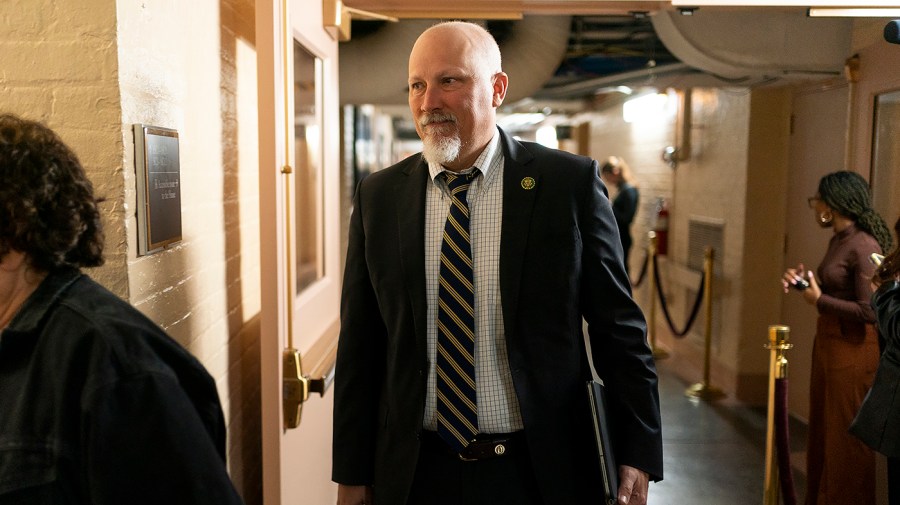
Rep. Chip Roy (R-Texas) arrives for a closed-door House Republican Conference meeting on Wednesday, March 6, 2024. (Greg Nash)
The package includes more than $490 million in funding for 22,000 Border Patrol agents, which Republicans are touting as the “highest level ever funded.”
Negotiators have been highlighting funding boosts for border security technology, funding for 41,500 detention beds, and increases to Border Patrol overtime pay that had been greenlighted in the annual Defense authorization bill last year.
Earlier this year, U.S. Customs and Border Protection (CBP) also increased its recruitment incentives that could climb as high as $30,000 for new Border Patrol agent applicants, as the office struggles to bring in new talent.
Democrats have also seized on a lack of border wall funding after a partisan fight over Department of Homeland Security (DHS) spending.
The bill comes as both sides have ramped up their messaging on the border ahead of the presidential election in November. But conservatives have already said more is needed as they press for hard-line policy changes.
“Having more ICE [Immigration and Customs Enforcement] beds isn’t going to do crap when they have ICE memos in place that are saying don’t go enforce the law,” Rep. Chip Roy (R-Texas) told reporters after GOP leadership highlighted some DHS funding at a meeting earlier this week.
“Getting more Border Patrol agents just means processing more people, right? If you don’t have the policy changes, you still have open borders.”
Defense

Speaker Mike Johnson (R-La.) attends a Gold Medal Ceremony Honoring the Ghost Army at the Capitol on Thursday, March 21, 2024. (Allison Robbert)
Defense spending overall sees a bump of more than 3 percent, in line with a deal struck between Biden and House Republican leadership last year to limit federal spending.
The Defense package, the largest of the 12 annual funding bills, contains $824 billion in funding. That includes more than $176 billion for military personnel, more than $287 billion for operation and maintenance, $172 billion for munitions and other procurement, and $148.3 billion for research, development, test and evaluation.
UNRWA
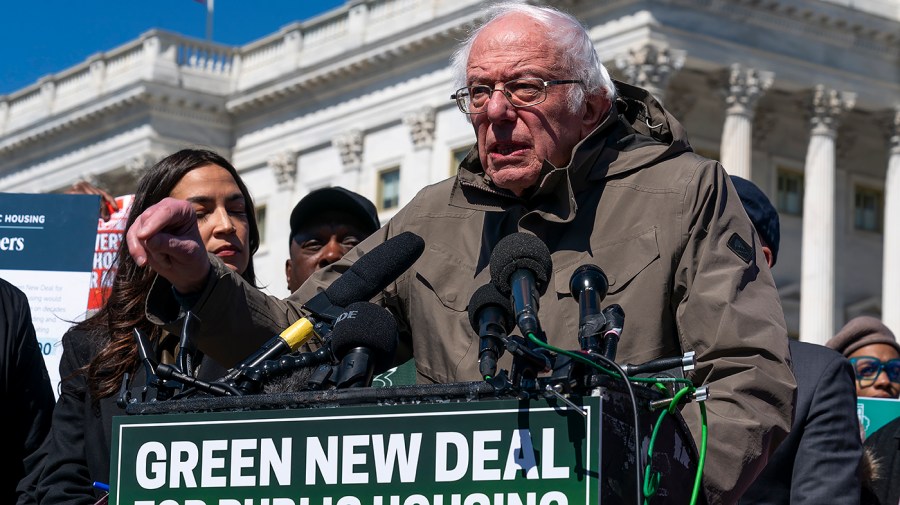
Sen. Bernie Sanders (I-Vt.) addresses reporters during a press conference to reintroduce the Green New Deal for Public Housing Act on Thursday, March 21, 2024. (Greg Nash)
Republicans are touting a deal restricting funding to a key United Nations agency that provides relief for Palestinian refugees, known as UNRWA.
The Biden administration said it would temporarily halt funding to the agency in light of allegations that a dozen of its staffers took part in Hamas’s attack on Israel last October.
But Democrats had pressed for funding to be continued with new restrictions for the agency, which has more than 30,000 employees, seeing it as critical in getting out massive amounts of food and humanitarian assistance.
“Do they consider a win the fact that children are starving to death in Gaza and are going to be unable to get the food and medical supplies they need because of the lack of funding to UNRWA?” Sen. Bernie Sanders (I-Vt.) told The Hill. “If that’s a win, I’d hate to see what a loss looks like.”
Republicans say the bill would also eliminate funding for the United Nations Commission of Inquiry against Israel.
PEPFAR
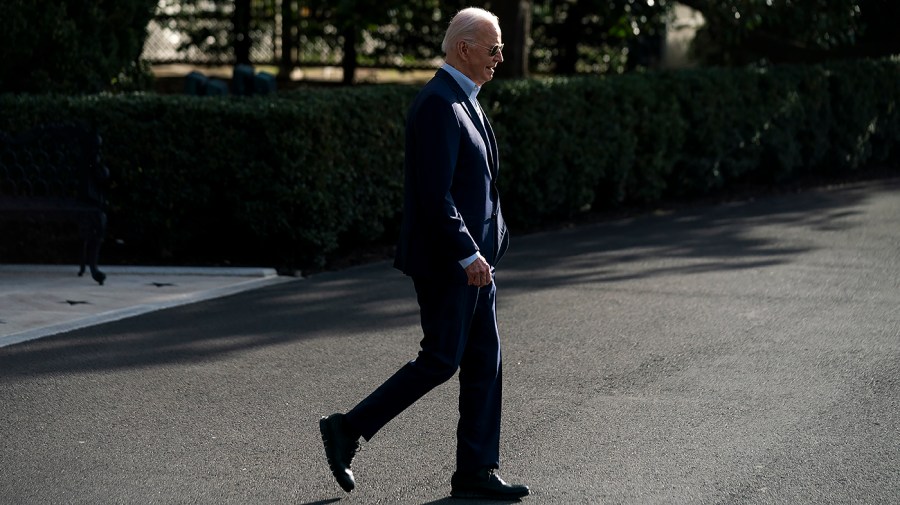
President Biden heads toward Marine One on the South Lawn of the White House in Washington, D.C., on Tuesday, March 19, 2023. Biden is heading to Nevada, Arizona and Texas for various campaign and official events. (Greg Nash)
The package includes $6 billion for the president’s Emergency Plan for AIDS Relief (PEPFAR), as well as $1.65 billion for the Global Fund.
Congress previously allowed parts of the program to expire last year, as some Republicans and conservative groups targeted the funding amid debate over abortion.
Election security
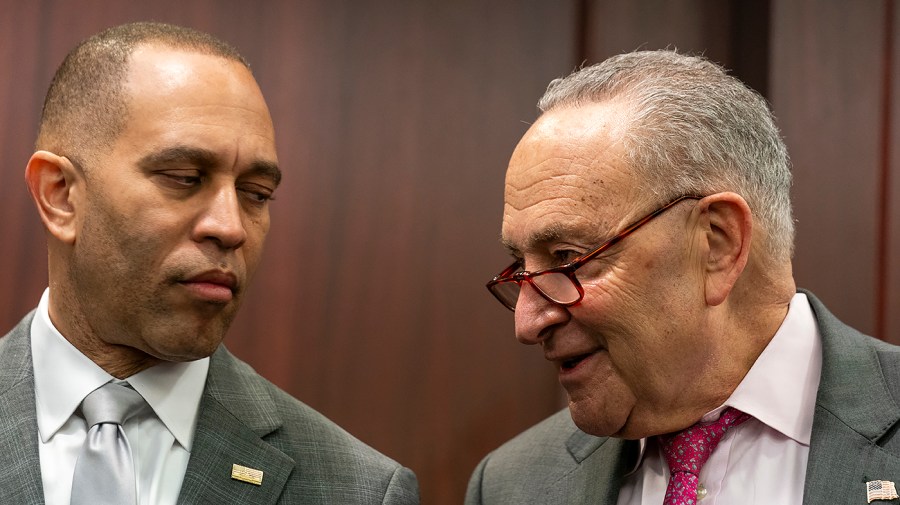
Minority Leader Hakeem Jeffries (D-N.Y.) and Majority Leader Chuck Schumer (D-N.Y.) are seen during a press conference to mark the 14th-anniversary of the Affordable Care Act on Thursday, March 21, 2024. (Greg Nash)
Democrats are highlighting $55 million for election security grants, after House Republicans sought to eliminate funding in the area in their initial proposal last year.
Democrats say the funding will “help augment state efforts to improve the security and integrity of elections for Federal office.”
Congressional pay
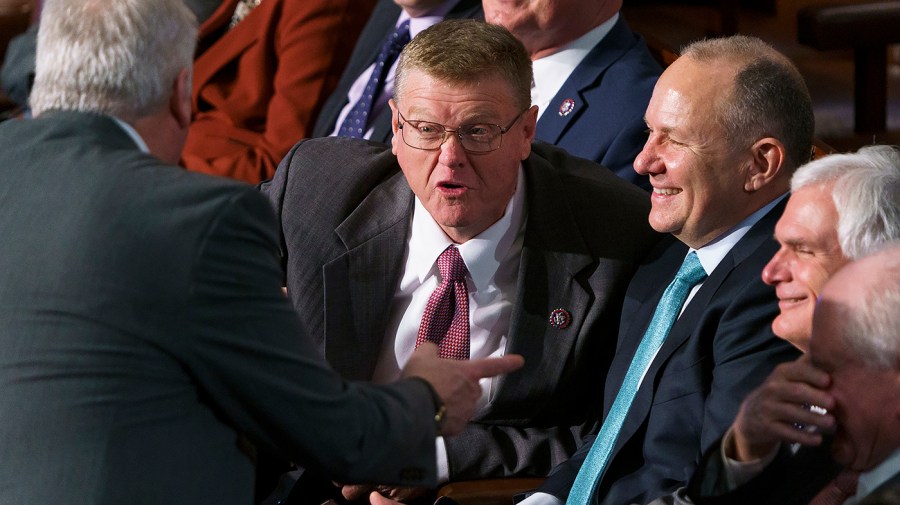
Rep. Mark Amodei (R-Nev.) is seen during the thirteenth ballot for Speaker on Friday, January 6, 2023. (Greg Nash)
The bill includes no pay raise for members, upholding a years-long freeze on lawmakers’ pay.
Rep. Mark Amodei (R-Nev.), chair of the subcommittee that produces the annual legislative branch funding bill, previously said he was pressing for a vote that could allow a pay raise for members.
While he noted the legislative branch funding bill passed by House Republicans last year upheld a years-long prohibition on annual cost-of-living adjustments (COLA), he told The Hill that “members want a chance to vote on a COLA.”
TSA

Transportation Security Administration agents process passengers at the south security checkpoint in Denver International Airport. (AP Photo/David Zalubowski)
The package includes more than $10.5 billion for the Transportation Security Administration (TSA), which is $1.2 billion above fiscal 2023 levels.
More than $1 billion goes toward increasing funding for TSA workers for maintaining “pay equity investments started last year and to invest in the expansion of protecting TSA workers’ rights,” Democrats say.
A source familiar said the funding was part of a dispute between both sides over the weekend as they negotiated the annual DHS funding bill, one of the six bills included in the package unveiled early Thursday.
Child care and education
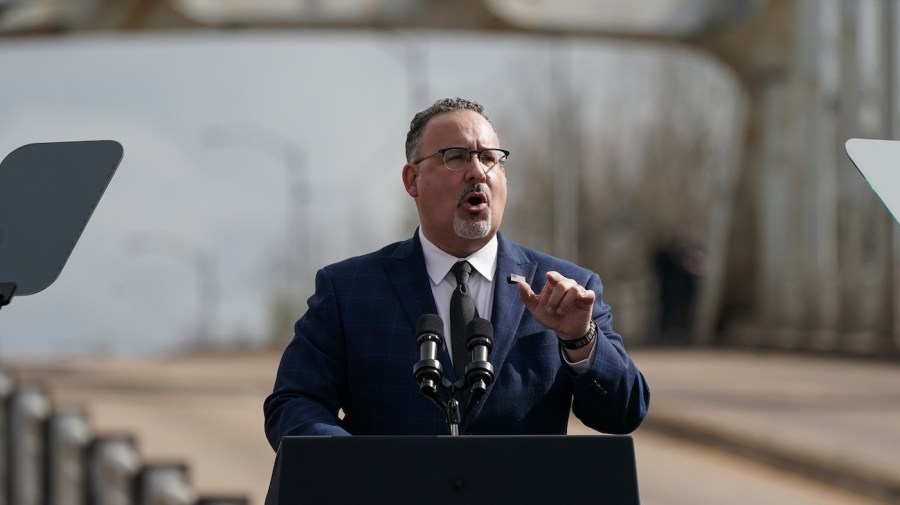
SELMA, ALABAMA – MARCH 3: Miguel Cardona, U.S. Secretary of Education, speaks on the 59th commemoration of the ‘Bloody Sunday’ Selma bridge crossing on March 3, 2024 in Selma, Alabama. In her remarks Harris called for an “immediate ceasefire” in Gaza but reiterated that Israel has “a right to defend itself”. (Photo by Elijah Nouvelage/Getty Images)
Democrats say early childhood education programs saw the biggest funding jump in the package, up $1 billion compared to the previous year.
That includes boosts for Child Care and Development Block Grants, Head Start, and the Low Income Home Energy Assistance Program. The package also increases funding for the National Institutes of Health, the Centers for Disease Control and Prevention, Substance Abuse and Mental Health Services Administration, and the Health Resources and Services Administration.
Top Stories from The Hill
- Conservatives rail against funding package: ‘An abomination’
- FBI headquarters funding draws sharp backlash from conservatives
- What made the cut in Congress’s $1.2 trillion funding deal?
- GOP primaries flash warning signs for Trump
Spending would rise for Title I grants and historically Black colleges and universities and minority-serving institutions.
The increases are covered by the annual funding bill for the departments of Labor, Health and Human Services, and Education. It’s one of the six funding bills the House is expected to consider as part of the larger package Friday and key to Democrats’ priorities.
Cuts
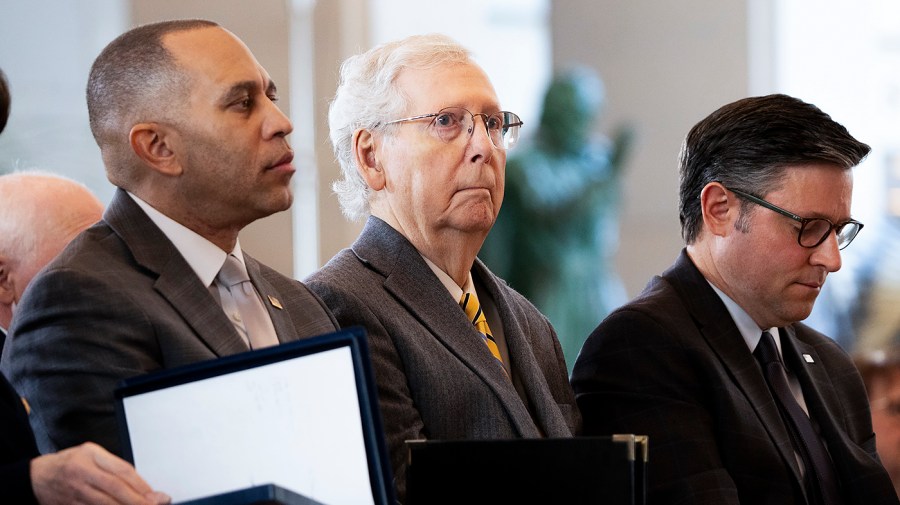
House Minority Leader Hakeem Jeffries (D-N.Y.), Senate Minority Leader Mitch McConnell (R-Ky.) and Speaker Mike Johnson (R-La.) attend a Gold Medal Ceremony Honoring the Ghost Army at the Capitol on Thursday, March 21, 2024. (Allison Robbert)
While House Republicans don’t achieve the significant cuts to nondefense programs pursued in their initial proposed funding bills, both sides note some spending reductions.
Negotiators note more modest cuts or freezes to offices across the package, as nondefense spending is overall considered to be flat-funded when compared to fiscal 2023.
That includes smaller spending decreases for offices like the Federal Trade Commission, the Federal Emergency Management Agency, the Cybersecurity and Infrastructure Security Agency, and the Office of National Drug Control Policy.
Other areas saw bigger cuts. While Democrats were able to secure $55 million in funding for election security grants, they also note the amount is $20 million less the previous year. The package also includes $947 million for the Architect of the Capitol, which is $368 million less than the year before.
The IRS also saw a funding freeze, along with the Financial Crimes Enforcement Network, the Federal Communications Commission, Workforce Innovation and Opportunity Act State grants, and Job Corps.
FBI headquarters
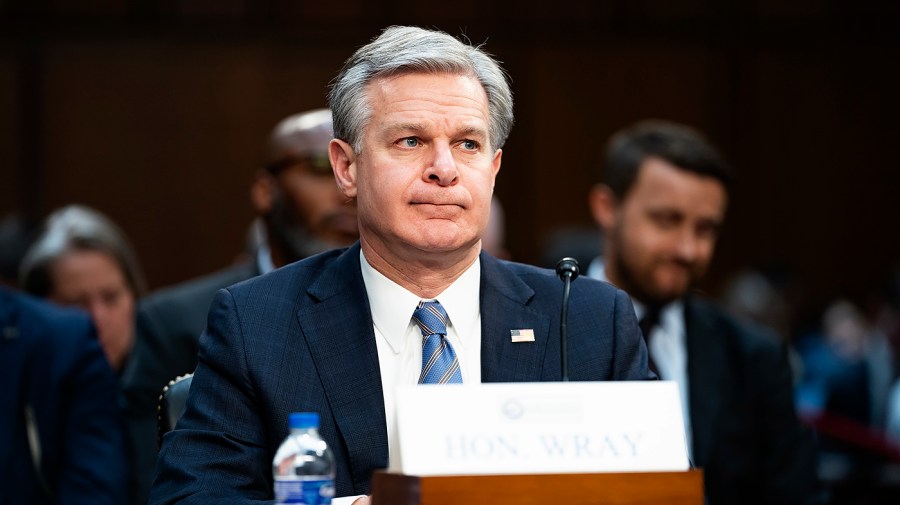
FBI Director Christopher Wray is seen at a Senate Intelligence Committee hearing to examine worldwide threats at the Capitol on Monday, March 11, 2024. (Allison Robbert)
The package includes $200 million for the Federal Bureau of Investigation’s headquarters as part of the annual general government funding bill tucked in.
The money for the FBI has already drawn backlash from hardline conservatives, as Republicans clashed over funding for construction of a new headquarters amid increased scrutiny of the FBI from some lawmakers who have accused the agency of being weaponized against former President Trump.
The news comes after Republicans highlighted a $654 million cut to the FBI’s operating budget in the initial batch of full-year funding bills that passed Congress earlier this month.
Republicans also pointed to what they described as a 95 percent cut to the FBI’s construction account, amounting to a $621.9 million reduction, at the time as part of an effort “to address the weaponization of the growing bureaucracy within the FBI.”
“The $1.2 trillion, 1000-page swamp-bus released in the dead of night includes $200 MILLION for a new FBI Headquarters So much for those ‘cuts’ to FBI,” Rep. Chip Roy (R-Texas) wrote on X on early Thursday.
Updated on March 22 at 7:45 a.m. EDT
Copyright 2023 Nexstar Media Inc. All rights reserved. This material may not be published, broadcast, rewritten, or redistributed. Regular the hill posts







